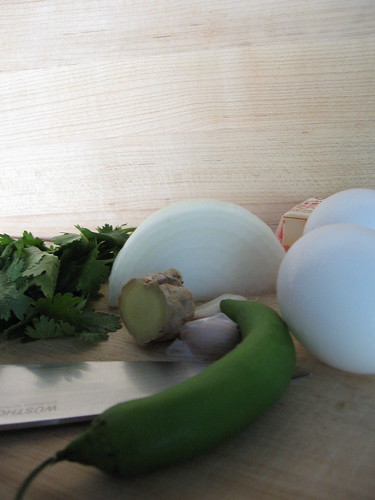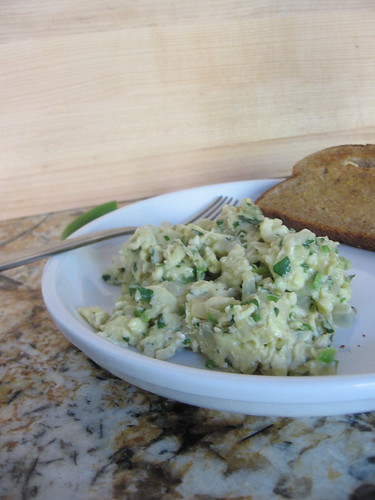Last weekend, I carefully planned out a savory tart. There were mushrooms, there was cheese, there was a buttery crust and rich custardy base. After an hour in the oven, the tart was puffed up, golden-brown, and smelling of heaven. I'd forgotten to parbake my crust earlier in the evening, and the clock was creeping steadily to a time even the most traditional European would find absurd, so I was hungry, excited, and hurried—a bit too hurried.
I would have taken a picture for you if I hadn't sat down on the floor and wept when the entire tart fell to the ground, upside-down of course, onto a freshly cleaned floor. I'm usually one to curse at food failures rather than cry, but facing a 9:30 dinner smeared across the kitchen floor was just too much.
You will forgive me, I hope, for spending putting my kitchen in time out for a day or two—save cobbled-together lunches and pasta or sandwiches for dinner, it took me nearly half a week to get the fortitude to start cooking again.
Perhaps I was still a bit frustrated, because kneading bread was the most appealing thing I could think of when I returned to the kitchen. I made chapati to go with Indian food (the chapati didn't puff), and made my own phyllo dough for spanakopita (not a failure, necessarily, but no better than storebought and definitely not worth the aching arms I have today).

When all else fails in the kitchen, I make eggs. Eggs are one of the world's perfect foods, and they're pretty hard to mess up. Granted, I've made my share of egg disasters—boiled eggs forgotten on the stove for 30 minutes, fried eggs put in a too-hot pan, soft boiled eggs taken off the heat too early—but on the whole, I can rely on eggs in a pinch to make a great meal.
I swear, I could work for the American Egg Board—I love them cooked just about every way, and I'm a big proponent of eggs-for-meals-other-than-breakfast. A fried or poached egg on braised cabbage or kale is one of the great pleasures in life; a boiled egg with a bright yellow yolk tops pickled asparagus for a delicious (and beautiful) appetizer; swirled into nearly any brothy soup just before serving makes a filling and rich meal.
While I normally prefer my breakfast eggs fried or soft boiled (or really, any way that offers a runny egg for satisfactory toast-dipping), my favorite way to eat scrambled eggs is akuri. I first discovered akuri when browsing through My Bombay Kitchen, a fantastic cookbook (and fascinating read) by Niloufer Ichaporia King. The book focuses on traditional Parsi dishes, and within a day of buying the book, I was searching through it to find something I could make without going to the store. My eyes caught the words "scrambled eggs", and I headed to the kitchen.
Like any dish, from pasta with tomato sauce to green beans, there are as many different ways to make akuri as there are people to argue that their method is the best one. Some people may add tomatoes, others turmeric, still others garam masala or cumin. I've made it a dozen different ways, but eventually I settled on this method as my favorite.

Akuri, or Parsi-style scrambled eggs
Adapted from My Bombay Kitchen
I usually eat eggs alone (how sad!), so this recipe is just for one—it scales up easily: just use a bigger pan and allow more cooking time. Also, the original recipe called for ginger-garlic paste, a staple of Parsi cuisine, but I rarely have it made; if I'm making a big meal, I'll make some, but for breakfast I just mince them together as below.
2 large eggs
2-3 teaspoons heavy cream
salt
½ tablespoon butter or ghee
3-4 tablespoons finely chopped onion
1 clove garlic
1 small knob ginger
1 small serrano chile
1 ½ tablespoons chopped cilantro
Beat the eggs very well with the cream and a generous pinch of salt; set aside.
Heat a small pan over medium heat. Melt the butter, then add the onion. Let cook, stirring occasionally, until softened but not browned, 4-5 minutes.
Meanwhile, peel and finely mince the garlic (I use enough to make nearly a teaspoon). Peel and mince the ginger, making sure that you have about the same amount of ginger as garlic. Quickly mince the ginger and garlic together, crushing them lightly with the side of the knife to release the juices and make a coarse paste (some salt helps; also, a mortar makes quick work of this if you don't mine the additional dishes); set aside. Mince the chile, first removing the seeds if you like less spice. Chop the cilantro and set aside.
When the onion is cooked, reduce the heat to low and add the ginger-garlic paste and the chile. Stir well and let cook until very fragrant but not sizzling loudly, 1-2 minutes more. Briefly beat the eggs again and add them to the pan with the cilantro. Cook slowly, stirring often, until the eggs are softly set and very creamy.
Serve immediately with some sort of bread—I'm partial to buttered wheat toast, but it's also great wrapped in a piece of chapati or naan.
Serves one, but can easily be scaled up - just use a bigger pan and allow more cooking time

No comments :
Post a Comment